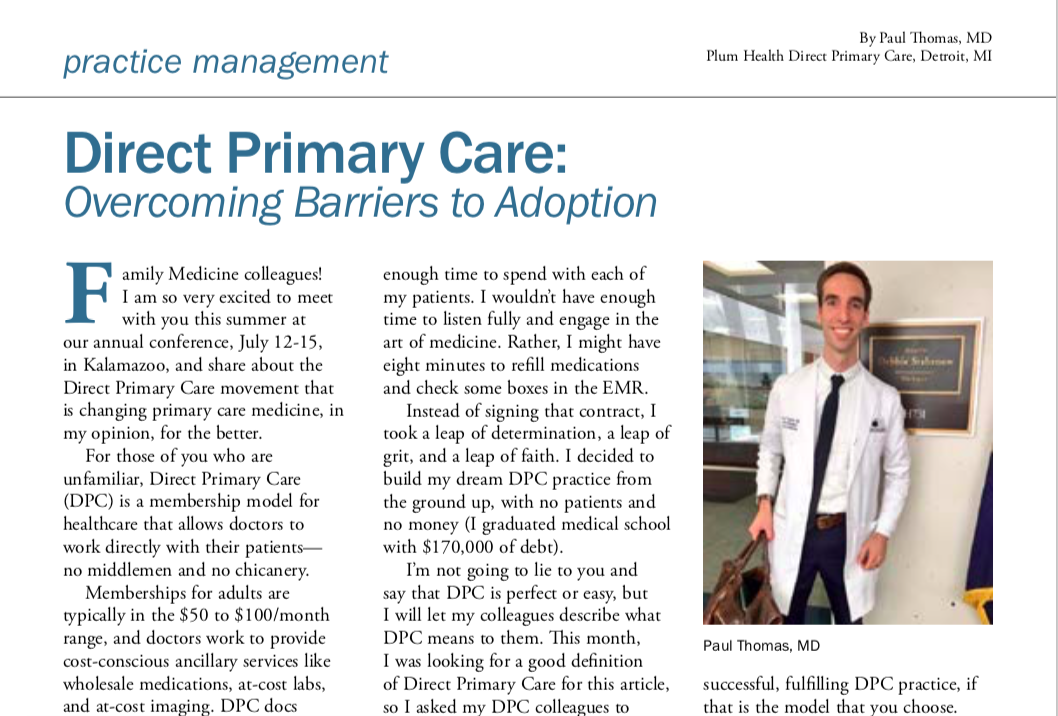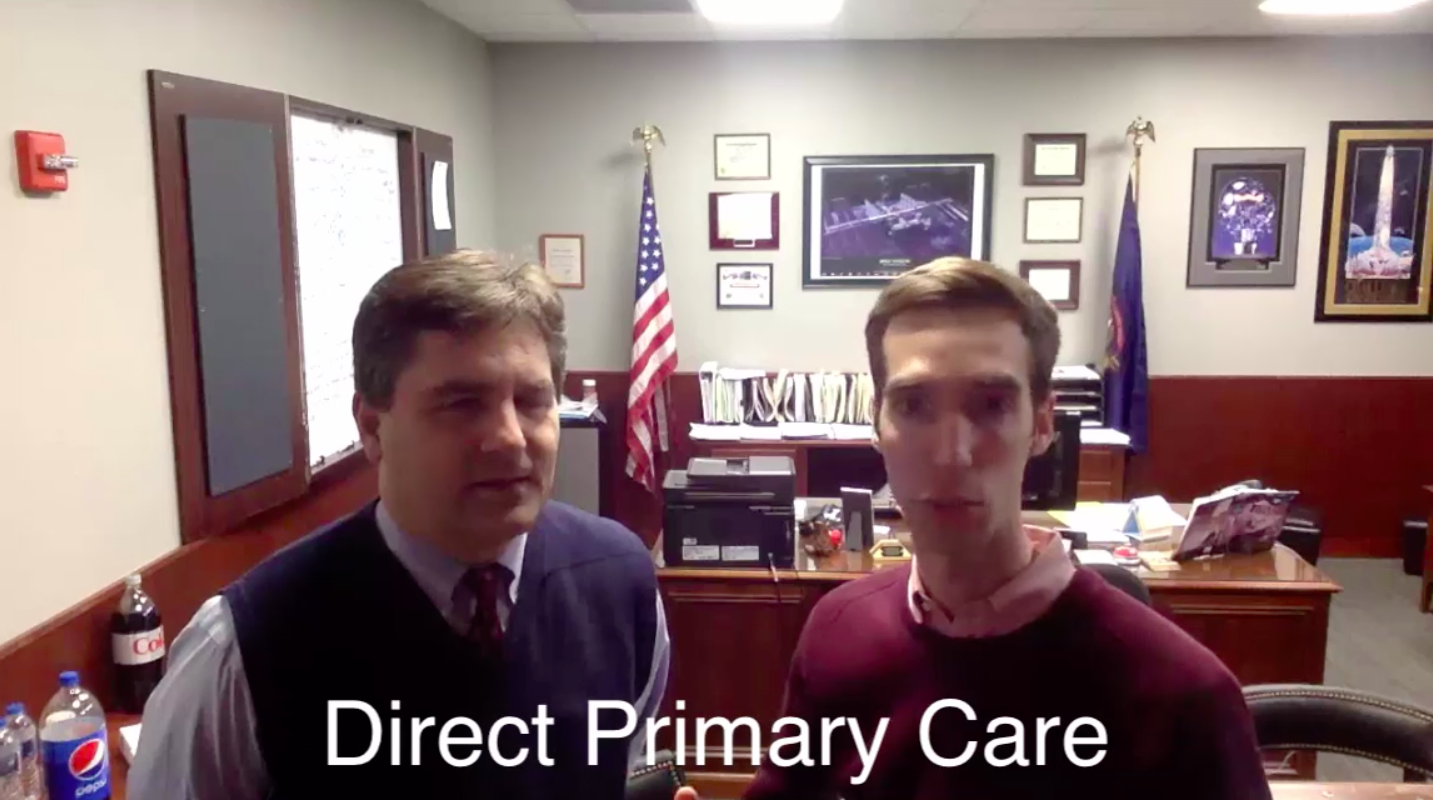Plum Health Blog
Frustrations Around Vaccine Rollout are Palpable
As we learn more about Coronavirus Vaccine availability, we'll keep you updated.
Vaccine Options for Oakland County Residents
For residents of Oakland County, there are some options, but they are not robust at this time.
One option would be the Oakland County Health Department. It looks like they are not yet vaccinating https://oaklandcountyvaccine.com/eligibility/
You could periodically check this website to see when they are opening up mass vaccinations.
The other option would be Beaumont Health. However, their website crashed on Friday from people trying to make appointments.
You could try to create an account via the MyBeaumont Chart, here: https://www.beaumont.org/my-beaumont-chart and hope that they send an email to you.
Some of our patients have received an email invitation via the Beaumont MyChart system to get the vaccine. They are trying to give it to people over 75 and then over 65 years of age.
Henry Ford Hospital is doing something similar. Here’s some information from the Detroit Free Press:
Don't call us. We'll call you.
That's what the state's COVID-19 vaccine website and many local health departments are telling seniors, teachers, child care workers and law enforcement officers who will be eligible starting Monday for coronavirus vaccines through an expansion of the statewide immunization program.
In part, that's because local health officials had almost no heads up before Gov. Gretchen Whitmer announced anyone 65 or older would soon be eligible to be vaccinated.
Whitmer announced Wednesday that starting next week, people in Priority 1B group will be able to get COVID-19 vaccines along with health care workers, people living and working in long-term care facilities and emergency medical responders who are part of the 1A Priority group.
In short, a lot of people are feeling frustrated and confused about the vaccine roll out - you're not alone in this.
As we know more information, we will share it with you.
As an addendum, in yesterday’s blog we talked about the Vaccine Rollout at the TCF Center in Detroit. Some of our patients have been calling the number since 9 am and it has been continually busy. If you get through, please send me an email or drop a comment on the bottom of this post.
- Dr. Paul Thomas with Plum Health DPC
Conversations about Direct Primary Care with a Senior Undergraduate Student at Michigan State
Conversations about Direct Primary Care with a Senior Undergraduate Student at Michigan State
Pre-medical students have a ton of questions about their future and their careers in medicine. As an undergraduate, this can often be a black box - you can see doctors on the other side, but it's hard to look closely at the medical school and residency training processes.
Often times, I'll chat with pre-medical students, medical students, and residents who have insightful questions about medicine and the future of health care in our country. Karan, a Senior Undergraduate student or a pre-medical student at Michigan State University, allowed me to record our conversation and to share it with other pre-medical students like him.
We had a wide ranging conversation as we discuss Direct Primary Care, Plum Health DPC, what inspired me to be a doctor, how to prepare for medical school interviews, and more. Here’s a list of what we touched on during this conversation:
How to scale a direct primary care practice
What does a direct primary care doctor do with their time each day
How a diverse group of doctors can best serve the needs of our communities
Building a team that reflects the needs of our population
Physician burnout and what may be causing physician burnout among doctors
Patient panel sizes in primary care and how they are different between direct primary care and fee-for-service medicine
Price points for direct primary care practices
How direct primary care bridges the gap between Medicaid and private insurance plans
How direct primary care practices can help people across the income spectrum
How direct primary care practices can lower the cost of medical care by preventing emergency room care and urgent care visits
How the Affordable Care Act codified perverse incentives in the health care ecosystem
How the limited free market in the health care space drives up prices in health care
The downsides of having health insurance provided via employment and employment contracts
How we can push towards transparent pricing at a grassroots movement
How has the Coronavirus Pandemic affected Direct Primary Care practices
How can pre-medical students improve their chances of getting into medical school and what kind of activities can help them considering the limited opportunities of shadowing during the Coronavirus pandemic
What inspired Dr. Paul Thomas to go into primary care medicine
How will the health care system change over time, especially in the context of the ongoing Coronavirus Pandemic
The three factors that make a career in medicine fulfilling
The real reason why you should pursue a career in medicine
This conversation was a little bit different than the typical videos that populate my YouTube channel and associated blog, but I think you'll find this information valuable and enjoyable. My goal with this is to uplift the doctor and patient relationship, and help to doctors and patients to find greater understanding of each other, and I think this video helps with this process.
After our conversation, the undergraduate student sent me this note:
"As someone who is extremely excited about going into medicine, the constant messaging to us about how the healthcare system is broken, how as doctors we aren't set up to serve our community, but rather to line the pockets of insurance companies, was very discouraging. It was a breath of fresh air to meet with you to see that there are still doctors who love what they do and are working to help fix a broken system and provide the best care to individuals. " - Karan, Undergraduate Student at Michigan State University
Thanks for reading and watching, and a big thanks to Karan for engaging in this sort of discourse,
- Dr. Paul Thomas, MD of Plum Health DPC
Plum Health DPC Featured in the Farmington Voice
Dr. Jamie Qualls of Plum Health DPC in Farmington Hills, Michigan was featured by the Farmington Voice this week. The Farmington Voice is a local paper that covers local news in the Farmington and Farmington Hills communities and Dr. Jamie Qualls and the arrival of her new primary care office therein received some nice coverage:
For a monthly membership fee, Plum Health Direct Primary Care (DPC) offers wholesale prices on medication and deeply discounted fees for x-rays and other tests. In addition, Dr. Jamie Qualls is available to patients anytime by text, email, or phone .
Having completed her residency in June, Qualls said this is the kind of medicine she has always wanted to practice. She chose the office in Civic Center Office Plaza, 25882 Orchard Lake Road, because of the central location and easy access to the freeway.
Here’s a link to the full article.
Dr. Jamie Qualls at her family medicine office in Farmington Hills, Michigan. Dr. Jamie Qualls is a family medicine doctor, using the direct primary care model, and is accepting new patients.
Dr. Jamie Qualls is a Family Medicine Doctor Accepting New Patients in Farmington Hills
Dr. Jamie Qualls is a Family Medicine Doctor Accepting New Patients in Farmington Hills, Michigan
Dr. Jamie Qualls has joined the team at Plum Health DPC. She is accepting new patients at our new location in Farmington Hills, Michigan. Dr. Jamie Qualls is trained in Family Medicine and she takes care of patients of all ages and stages, from birth to children, from adolescence to adulthood, from older adults to the elderly. She focuses on using plant-based nutrition to help her patients heal themselves by using food as medicine.
Thanks for reading and have a wonderful day,
-Dr. Paul Thomas MD
Press Coverage for Direct Primary Care in Detroit and Michigan
This was a big week for press coverage for Direct Primary Care in Detroit and Michigan. The bottom line is this: people are hearing more and more about this Direct Primary Care movement and we’re getting more and better coverage as the DPC movement grows.
Plum Health DPC Interview on The Craig Fahle Show
First off, we had a fabulous interview with Craig Fahle of Deadline Detroit. Craig Fahle is the former host of the Craig Fahle Show on WDET and he currently hosts the Craig Fahle Show on Deadline Detroit:
A mix of interviews and commentary, The Craig Fahle Show is a daily 30 minute podcast telling the important political, business, and cultural stories that matter to Detroit and Michigan. Hosted by Craig Fahle, an award winning journalist and talk show host who for years hosted his eponymous talk show on WDET, Detroit's Public Radio station.
Craig Fahle’s coverage of our story at Plum Health DPC was insightful and robust. He brought a really well thought out, professional approach to this interview. You can listen to the full episode here:
Dr. Paul Thomas of Plum Health DPC interviewed by Craig Fahle of Deadline Detroit on the Craig Fahle Show. The conversation focused on the Direct Primary Care model and the impact that it is having in the Detroit market.
Paul Thomas, MD of Plum Health Mentioned During WDET’s Detroit Today
Second, during WDET’s Detroit Today radio program with Stephen Henderson, a caller rang in and asked if there was a health care model similar to the Green Bay Packers, where everyone buys in and benefits from the system. Start listening to the interview at the 34:30 mark to hear the question and answer. Additionally, I’ve taken the time to transcribe the conversation here:
Kevin in Grosse Pointe Park: “My idea may be a little simplistic, but I’d love to see something modeled off of the Green Bay Packers. As in, all of us pay our premiums to a hospital on a monthly basis, so the doctors, and the nurses, and the hospitals get our premiums. Let’s eliminate the insurance companies and the in-betweens. The doctors and nurses own the hospitals and we own shares in the hospitals and have an interest in this possibility.”
Stephen Henderson, Host of Detroit Today: “Hmm. Kevin it’s simplistic but it does get to a fundamental issue in the healthcare system. What role do the insurance companies play, and how much money do they add to the cost of things in the system and is there a way to eliminate them all-together. Abdul El-Sayed, we had a physician on the program a few months ago, Paul Thomas here in the City of Detroit, who is treating patients by eliminating insurance. He doesn’t take insurance, he has them pay into kind of a share system like Kevin is talking about. He deals with pharmaceutical companies directly to lower the cost of the meds and it seems like he’s got kind of a solution to some of the problems we see in the system now. The idea of dealing directly with physicians and hospital systems rather than insurance companies. Is that maybe a way forward?
Abdul El-Sayed, MD, MPH: “So, I love Paul’s model and I think it’s a great model for primary care. You pay him, he takes care of you, it’s simple, you eliminate the middle man. In fact though, Kevin’s idea, that’s how insurance companies started.”
Dr. Abdul El-Sayed goes on to talk about the founding of Blue Cross with Baylor’s Hospital System. When I heard this conversation, I was absolutely floored! It’s amazing that Stephen Henderson recalled our conversation and offered our model as a solution to our current health care problems.
Paul Thomas MD of Plum Health DPC was mentioned by Stephen Henderson of WDET and Abdul El-Sayed during a comprehensive conversation of healthcare costs during the Detroit Today radio program.
Direct Primary Care Physician on Michigan Radio
Finally, a friend and colleague of mine, Matthew Falkiewicz, MD Of Nova Direct Primary Care in Grand Rapids was interviewed on Michigan Radio with Cynthia Canty.
“Before insurance companies, and co-pays, and filing claims, the relationship between doctors and patients was simple. Those who needed medical care would visit their doctor’s office or request a house call. Once that care was provided, the doctor was paid directly.
“Some physicians are bringing that model into the 21st century by offering direct primary care to their patients on a subscription basis.
“Dr. Matt Falkiewicz is a physician with Nova Direct Primary Care in Grand Rapids. His practice offers a membership-based model where patients pay a monthly fee”
All told, three big mentions of Direct Primary Care in Detroit and Michigan over the last 1 week. This tells me that there’s a growing momentum for Direct Primary Care in our state. When I first started in 2016, I was an early adopter, perhaps the second doctor in the state of Michigan with a pure Direct Primary Care practice. Now, there’s over 10 doctors practicing in the DPC model in Michigan.
I believe in this model and these doctors - Direct Primary Care allows us to serve our patients on their own terms, and not at the dictates or mandates of an insurance company. The DPC model allows us to develop caring relationships with our patients and to deliver the best service possible to our patients.
I’m really excited for this growing movement - thanks for reading!
-Dr. Paul Thomas with Plum Health DPC in Detroit, Michigan
Paul Thomas, MD of Plum Health DPC. Direct Primary Care allows doctors and patients to develop deeper, more trusting relationships that can result in better health for both patients and doctors.
Plum Health teaming up with Veterans Care Network
Plum Health teaming up with Veterans Care Network
Plum Health DPC is teaming up with Veterans Care Network to provide affordable, accessible healthcare services to those who have served in the military. Veterans Care Network has set aside some funding to sponsor a few Veterans and help them receive primary care services. They chose to use Direct Primary Care because they know how valuable the services in the DPC model can be.
Plum Health DPC Serves Veterans in Detroit
At Plum Health, we’re passionate about serving veterans and providing excellent healthcare services to all people, but especially those who have served our country. One of the biggest concerns that my patients who are Veterans have is the level of customer service at the Veterans Administration hospital. We rectify that issue by focusing our care on the patient and making sure that they not only have excellent healthcare, but also an excellent experience.
We’re excited to partner with Veterans Care Network, and if you’d like to apply for this opportunity, follow this link.
Thanks for reading and have a wonderful day,
-Dr. Paul Thomas with Plum Health DPC
Barriers to Starting a Direct Primary Care Practice and How to Overcome Them
I am so excited for this weekend! I'll be speaking at the Michigan Academy of Family Physicians annual conference on Saturday morning. The title of my presentation is "Direct Primary Care: Barriers to Adoption and How to Overcome Them." The lecture will be held at Western Michigan University and will start at 8:10 am.
Here's what the MAFP has to say about the presentation:
Direct Primary Care (DPC) is a dynamic and exciting practice model well-suited for Family Physicians. Its adoption in Michigan, however, has lagged behind other states, such as Florida, Colorado, and Kansas. This engaging session will begin by defining DPC and identifying successful practices in Michigan, as well as regionally and nationally. We will then identify barriers to starting a DPC practice and how to overcome them. Paul Thomas, MD, Plum Health Direct Primary Care (Detroit)
I am speaking because I believe that we have a unique opportunity to remake our healthcare system into one that is truly compassionate, and one that benefits all parties involved - namely patients, their families, their physicians and allied health professionals.
I am so enthusiastic about Direct Primary Care because it removes the middle men and barriers between patients and their doctors, and allows for a restoration of the doctor patient relationship. It also lowers costs on everything from office visits, to lab work, medications, and imaging studies.
If you're available, please join me for this lecture, Saturday July 14th at 8:10 am in Kalamazoo, Michigan.
Sincerely,
Dr. Paul Thomas with Plum Health DPC
Below is a PDF from the Michigan Academy of Family Physicians quarterly magazine about the upcoming presentation, and beneath that is a short video from the conference:
Finally, if you’re a Primary Care Doctor or Allied Health Professional that is looking to Start and Grow a Direct Primary Care practice, check out our sister site www.StartUpDPC.com.
Wayne State University School of Medicine History Presentation
Our video has been posted online! I had the opportunity to present the history of Wayne State University School of Medicine, and it is now available as a YouTube video. Check it out, below.
Thanks for reading and watching!
- Dr. Paul Thomas with Plum Health DPC
Guy Gordon Discusses Direct Primary Care on WJR
Today, Guy Gordon and Senator Patrick Colbeck discussed Direct Primary Care and the potential impact that it can have on the health and wellness of Michigan residents as well as the sustainability of the Michigan economy. The discussion was held on WJR News Radio (AM 760).
My name is Paul Thomas, M.D. and I am a family medicine doctor practicing in Southwest Detroit. I believe that healthcare should be affordable and accessible for everyone. I also believe that we can achieve this goal through direct primary care medicine.
It is a dream of mine to see and help more family doctors and primary care physicians transition from the fee-for-service model of healthcare to the direct primary care model. This will allow more doctors to deliver compassionate, truly patient-centered care with transparent pricing in our great state of Michigan.
To this end, I will be speaking at the Michigan Academy of Family Physicians statewide conference in mid July in Kalamazoo, Michigan about this very topic.
Thanks so much for reading and watching, and have a wonderful day!
– Dr. Paul Thomas, M.D.
What is Family Medicine?
Hello, this is Dr. Paul Thomas with Plum Health DPC and I'm a Family Medicine Doctor in Detroit. I operate Plum Health Direct Primary Care, which delivers affordable, accessible health care services in Detroit.
This week, I'm talking about Family Medicine Week, an official announcement from Governor Rick Snyder that makes February 19th - 25th Family Medicine Week. I'm a month late in bringing this up, but it's still important to recognize Family Medicine and the contribution of Family Medicine Doctors across the State of Michigan.
For starters, Family Medicine Doctors compete four years of undergraduate education, four years of medical school, and three years of residency. That's 11 years after high school and 7 years after college. Furthermore, some Family Medicine Doctors sub-specialize within Family Medicine.
They complete a 1 year fellowship to become Sports Medicine doctors, or Family Medicine doctors that sub-specialize in adolescent medicine, geriatric medicine, addiction medicine, etc...
The point is that Family Medicine doctors are highly trained, and specialize in taking care of the whole patient in the context of the family and the community.
Family Medicine doctors care for people of all ages and stages! We help deliver babies, we help infants meet developmental milestones, we complete school, work, and sports physicals, we take care of injuries like fractures and lacerations, and we take care of chronic conditions like diabetes, high blood pressure, and asthma.
Family Medicine doctors also work across a variety locations. Family Medicine doctors work in emergency departments, in-patient hospital settings, and out-patient clinics. Family Medicine doctors lead health departments for Cities, Counties, and States. Family Medicine doctors teach at medical schools, volunteer at homeless clinics, and travel abroad with organizations like Doctors without Borders.
Personally, I love being a Family Medicine Doctor - I love taking care of people regardless of their age, race, gender, and orientation. I love being able to offer care and compassion to those who need it, along with the standard medical care.
Finally, we need more Family Medicine doctors to create healthy communities, healthy cities, and a healthy nation. Family Medicine doctors address small issues before they become big, complicated problems. Family Medicine doctors and Primary Care Physicians can effectively increase the health of a community and lower the cost of care in that community.
Primary Care and Family Medicine is vital, and I'm glad that we have a week to recognize the work that Family Medicine doctors carry out each day in the State of Michigan.
Thanks for your time, and have a wonderful day,
- Dr. Paul Thomas
Medicaid Pilot Program in Michigan
Last week, we met up with Senator Patrick Colbeck in Lansing along with other legislators like State Representative Ned Canfield and other Direct Primary Care Doctors like Chad Savage of YourChoice Direct Care.
Currently, the State of Michigan spends 1/4 of the State Budget on health care programs like Medicaid. What I'm advocating for is better primary care and preventive services that create value for people in our State, that decreases costs over the long term by providing better care on the front end. The British say an ounce of prevention is worth a pound of cure, and by focusing more on primary care and prevention, I believe that we can take better care of our neighbors and save the State of Michigan money, money that can then be used to fix our infrastructure and spur economic growth and activity in our state.
Pragmatically, it may start with a Medicaid pilot program. Instead of giving Medicaid money to insurance companies to manage patients, that money is given directly to primary care doctors on a monthly basis to care for a panel of medicaid patients. The onus is then on the primary care doctor to provide excellent health care services for their community members and create more value and better health outcomes at a lower cost. I believe that this type of arrangement will allow for more holistic care, better access for patients, better outcomes, and cost savings.
I am excited about the prospect of this work and happy that we have some courageous leaders in this State who are willing to address these difficult problems head on.
Thank you so much for reading,
- Dr. Paul with Plum Health DPC























